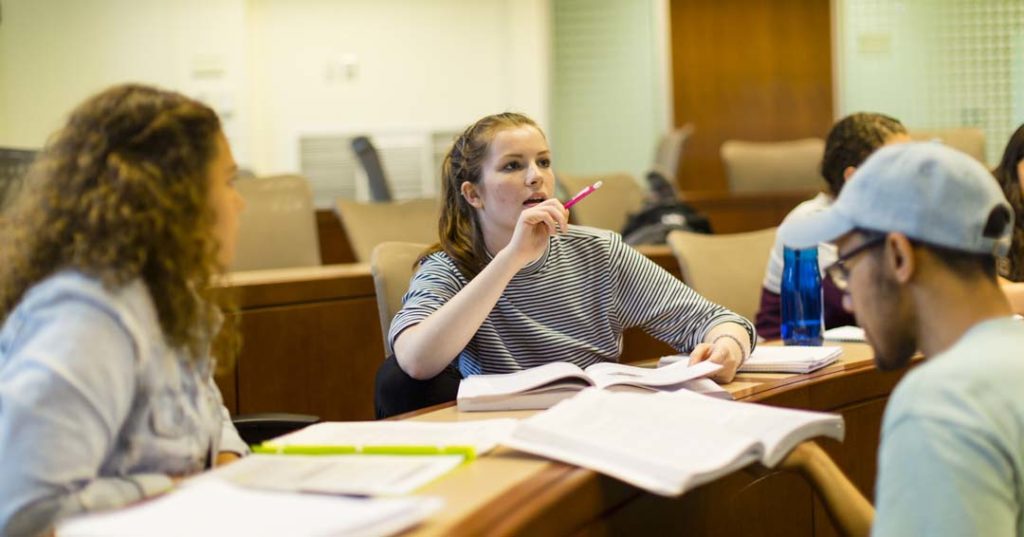7 Techniques to Help You Make the College Jump
As colleges and universities across the country officially kick off another academic year, a new class of freshmen is both excited and nervous about joining the ranks as college students. For those feeling some apprehension about starting the next chapter of your lives, I say to you: don’t worry, you’re not alone!
One of the questions I get asked most often as a college academic advisor is just how different is college from high school? Incoming students naturally want to gain a clearer understanding of what they can expect from their new academic environment. Some fear the idea of floundering in this sea of change, assuming there will never be an oar to save them.
The reality is, there are many ways in which college differs from your high school experience. The biggest difference being that the onus is now truly on you to navigate these new waters. With this in mind, here are seven recommendations to help you to steer yourself along the best course possible:
Manage Your Time In and Out of the Classroom
In high school, you have a very structured daily schedule with back-to-back classes, assigned lunch period, and possible extra-curricular activities or a job after school. Now that you are in college, you must manage your own time and balance your responsibilities and priorities. You may often have several hours between classes that you would consider “free time.”
Advice: As you’re finding your rhythm,schedule your “free time” with study sessions, visiting a Peer Tutor and taking care of yourself. If you want to learn more about time management skills, ask your Advisor to connect you with a professional staff member in the Academic Resource Center.
Be Prepared to Prepare Differently
Prior to entering college, you may not have had to read anything more than once, and sometimes you could get away with cramming the morning before a test. Your homework assignments and readings were discussed, and often retaught, in class.
Now, you find yourself needing to review notes regularly and are expected to study 5-7 hours each week outside of class time for each course. Your reading and writing homework assignments may not be directly addressed in class, either.
Advice: Create study groups with classmates to share ideas and ask questions. Also remember that if your professor doesn’t always check the homework, that doesn’t mean you don’t need to do it. You will still be responsible for that information on a test.

Seek Assistance
In high school, teachers approached you or notified your parents if they thought you needed assistance. If you were absent, they provided you with the material you missed. Even if you didn’t truly understand an assignment, you were still able to figure it out and get by on your own.
Now, your college professors are open and willing to help, but they expect you to initiate contact if you need assistance. They expect (and want) you to attend their scheduled office hours listed in the syllabus. You are responsible for the material you miss when you’re absent from class, and there is a lot more information covered in one college class meeting than there is in one high school class period. Whether you’re struggling to learn a certain concept or just want to boost your B to an A, there are opportunities and benefits to connecting with your Academic Resource Center peer tutors and math/writing specialists for extra help.
Advice: Review your syllabus at the start of each semester, and take note of your professors’ office hours. Stop by early in the semester to introduce yourself and ask questions about upcoming assignments. You should ask a classmate for a copy of their notes and visit the professor’s office hours if you miss class. Chances are, your college provides a variety of options for additional support, but you have to take the first step to seek it out. Attend the first study session hosted by a Peer Tutor for your course while you prepare for your first college level exam! Make an appointment with a writing specialist in October to begin brainstorming ideas for your final paper due in December!
View Learning as a Growth Opportunity
Remember when you focused your attention on your favorite class and just endured the others? In college, any course that helps you develop a broader understanding and new perspectives should be seen as a fundamental building block of your education. College is the time to learn something new, and even though it may not seem related to your major, it is an opportunity to build skills beyond your major that will help you in your career field.
Advice: Choose a general requirement that sounds interesting or is about something you’ve never learned before, rather than picking the one that sounds easiest. Take a psychology course to boost your understanding of how marketing elicits favorite responses from consumers. Or boost your biology curriculum with a philosophy course in the ethics of science heath care. You will find you develop a multidimensional understanding of disciplines within the liberal arts and sciences that could also provide a stronger foundation for a lifetime of employability.
Assess Your Long-term Strategy
In high school, a lot of your learning may have involved memorizing, and “getting the answer” was the goal. The only important material was the information that would be on the test. Learning what you need to know so you can do well on the exam is important, but it’s not the only important thing as a college student. All of the information you learn may not be on the exam, but it will likely help you in future courses and in your career. Professors think carefully about how each assignment will help you learn and apply the material in your future.
Advice: You don’t always need a study guide for an exam, and you will most likely not always have one. Practice your study techniques and learn what works best (or what doesn’t work) for you! If you want to learn more about improving your study strategies, ask your Academic Advisor to connect you with the ARC professional staff.

Know Your Graduation Requirements
In high school, most of your classes are arranged for you, and you are not responsible for knowing what it takes to graduate. Now, you will arrange and register for your own classes, in consultation with your Academic Advisor. Your Academic Advisor will also review course graduation requirements, but you are responsible for following your four-year academic plan and for asking questions if you are unsure.
Advise: Always attend Group Advising sessions to learn more about how your Academic Advisor can assist you, the graduation requirements, and how to register for courses/create a four-year academic plan. You are also responsible for making individual appointments with your Advisor each semester.
Remember, You Are Responsible – But Not Alone
As a high school student, your parent/guardian could call the school office to help you if you had a question or your teacher could call your parent/guardian if they had a concern regarding your performance in a class. In college, the Family Educational Rights and Privacy Act (FERPA) dictates that college employees are unable to share information about your academic or personal status with anyone (even parents) without your documented permission.
Advice: If you have a question or concern and you don’t know who can assist you, start by asking a faculty or staff member you do know. If they don’t have the answer, they’ll know who to send you to that will. Don’t be afraid to ask for help, that’s exactly what we’re here for!





 About Insights
About Insights
 About Emmanuel
About Emmanuel